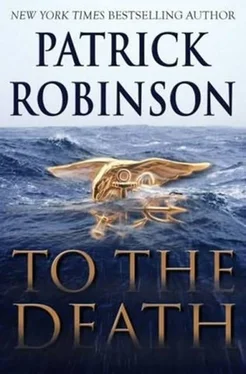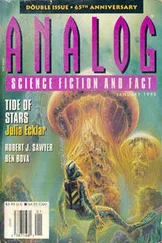And even as he pushed out through the first yards of his journey, the submarine moved gently forward and then slipped beneath the surface, heading back south. Ravi had no idea where she was going.
The night was cool now, and Ravi wished he had worn his sweater rather than stuffing it into his bag. The Zodiac ran easily through these inshore wavelets, but he did not want to wind her up and charge into the harbor at full speed, mostly for fear of awakening one of the yachtsmen and then being noticed.
Instead, he just chugged along, heading in toward Streek Head, making about six knots instead of the twenty this light, fast craft would undoubtedly achieve with the throttle open. For the first time in many days, he had no interest in the depth of the water. The Zodiac drew only about a foot and a half, and, as harbors go, Crookhaven has considerable depth. In the eighteenth century, mail boats from the United States, even clipper ships, had pulled in here. There were even dark mutterings during World War II that German U-boats had anchored here and been refueled, such was the widespread hatred of the English in this part of the world.
No one has ever admitted such a thing, but the rumors have persisted, and many people have stark memories of outbursts by mostly elderly Cork men, banging their fists on the table at the opening notes of “It’s a Long Way to Tipperary”-“I’ll not have it sung in this house. That’s an English marching song.”
It all dates back to the first quarter of the twentieth century and the English occupying army, the detested Black and Tans. Just thirty miles from Crookhaven, east along the coast, stands the village of Clonakilty, birthplace of the Big Fella, Michael Collins, commander in chief of the Army of the Irish Free State-the guerrilla warfare patriots who finally drove the English out forever.
Collins and General Rashood had much in common. Both men taught their eager but reckless troops to fight in a more orderly fashion, against an overwhelming force. Both men carried within them a burning hatred of the opposition, and both men took part in spectacular strikes against their enemy. The heartbreaking heroism of Michael Collins and his Cork-men in the Easter Rising in Dublin, 1916, facing English artillery with only pistols, is the very fabric of Irish legend, right up there with Brian Boru at Cashel.
There is still an annual memorial service down here in Cork on the anniversary of his death. There are books, there are films, there are songs.
Some they came from London,
And some came from New York,
But the boys that beat the Black and Tans
Were the boys from the County Cork.
Even now, it is still commonplace along this stretch of coastline to meet a perfectly normal young Irishman who, in the context of the Easter Rising, will say, “Ah, yes. The boys fought very bravely that day.” As if it had been yesterday. Always as if it had been yesterday.
That rugged coastline of West Cork, home to the boys who beat the Black and Tans, was a fitting place for the archterrorist leader to land that night-in the dark, after a long journey, with murder in his heart, the murder of an enemy to his people. The Big Fella would have been very proud of Ravi Rashood.
He rounded Streek Head at 0520. The flashing-light warning of a jagged rock on the right-hand side coming in was still effective. It was not yet daylight. But dawn was breaking in the eastern sky, behind Ravi.
Crookhaven Harbor is a mile long, and up ahead the Hamas general could see more big moored yachts than he would have ideally liked. There must have been twelve, at least, but none carried lights, and there was no sound from the sleeping crews. There was the occasional soft clatter-clatter-clatter of a loosely cleated halyard, but the yachts sat quietly on their lines in the light wind.
Ravi throttled back, cutting his speed to dead slow, chugging along with the Yamaha engine just idling behind him. So far as he could tell, there was no one on deck, no one looking, and no one on shore. Ireland is not famous for its early risers at the best of times, and Crookhaven Harbor would never have been confused with any seaport in the USA where, it always seems, everyone is up and shouting the moment dawn breaks, loading, unloading, weighing, casting off, revving up, selling, buying, drinking coffee, laughing, lying, doing deals.
Sleepy West Cork was the perfect spot for a mass murderer to slink into Europe ’s most westerly outpost. Ravi chugged on, sliding between the yachts, aiming for a little beach at the edge of the village. He knew there would be little shelving of the seabed in this deep harbor. So he just ran directly inshore, cut the engine, and planted the rubber bow of the Zodiac straight onto the sand.
He grabbed the painter, jumped forward onto dry land, and hauled the boat after him. Swiftly, he dropped his bag onto the sand, took off his shoes, socks, pants, T-shirt, and jacket, and stepped into the water in his boxer shorts. It was freezing, and he leaned over the gunwales to restart the motor. He dragged the boat around so that it faced back down the harbor, and then he leaned over some more and grabbed a tiny clock that had been lying on the deck, with several electric wires holding it in place.
Ravi turned the dial to the sixty-second mark, pressed a small button on the side of the clock, and then marginally opened the throttle of the Yamaha. Then he let it go, and the unmanned Zodiac chugged out into deep water, heading east, at around eight knots, down toward Streek Head. Ravi turned away and pulled on his T-shirt. He was only wet to his thighs, and he put on his pants and his socks and shoes.
But before he had time to pull on his jacket, there was a short dull thump in the water, the thud of explosives. And immediately the Zodiac began to sink, the bottom of its hull blown out with an expertly set hunk of TNT. Ravi had attended to this personally, inside the submarine. The hole in the Zodiac’s bottom was perfect, four feet across. It took precisely fifteen more seconds to vanish completely, below the fifty-foot-deep outer harbor waters.
It was not yet six o’clock. And Ravi scanned the land around him. There was no sign of life. He looked out to the moored yachts and there was neither sight nor sound of anyone. Excellent, he thought, I’ve landed in Ireland, and not one person knows I’m here. But he was wrong. Someone did.
Up on the foredeck of the 54-foot American-built sloop Yonder was Bill Stannard, the skipper and helmsman. He had elected to sleep on deck after a four-hour alcoholic binge at the Crookhaven Inn, right next to the sailing club. Right now, in the early hours of the morning, he was very cold, and he was nursing the opening symptoms of a monumental hangover.
Bill, at thirty-eight, had sailed Yonder across the Atlantic from Rock-port, Maine, with only two crew members. He was meeting the owner, a member of Boston ’s Cabot family, right here in Crookhaven two days from now. The previous evening’s blowout at the inn was his last throw. He would not have another drink for a month, while the owner and guests were aboard. But this did not, of course, diminish his own plight right here on the foredeck, with a head that felt as if it had been hit by a guided missile.
The very slight chug-chug of Ravi ’s motor had awakened him. It was not so much the noise, but a change in the vibrations in the air. Bill was a former U.S. Navy submariner, a petty officer, stationed at New London, Connecticut. And like all submariners, listening was second nature to him: listening for the slightest change in the regular beat of the submarine’s engines, for any alteration in the air pressure, for the merest vibration on the shaft, the distant rattle of a carelessly stowed toolbox.
Ravi ’s engine altered the air around the sleeping Bill Stannard, and in a flash his eyes opened and his senses came alert. It took a few more seconds for him to work out where he was, and indeed whether he was still genuinely alive. But he raised his throbbing head and looked out over the port bow, where he saw a slow-moving Zodiac making its way across the harbor.
Читать дальше












